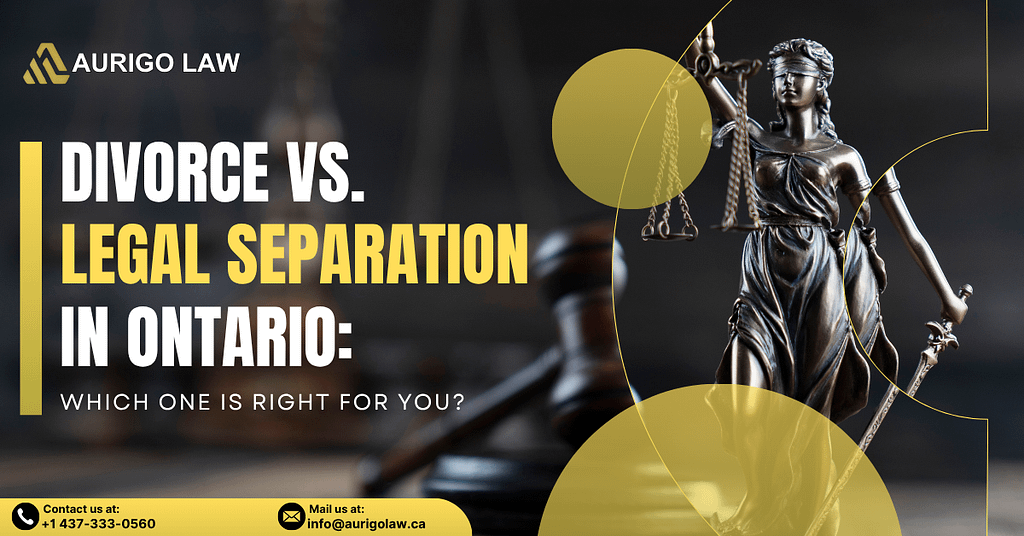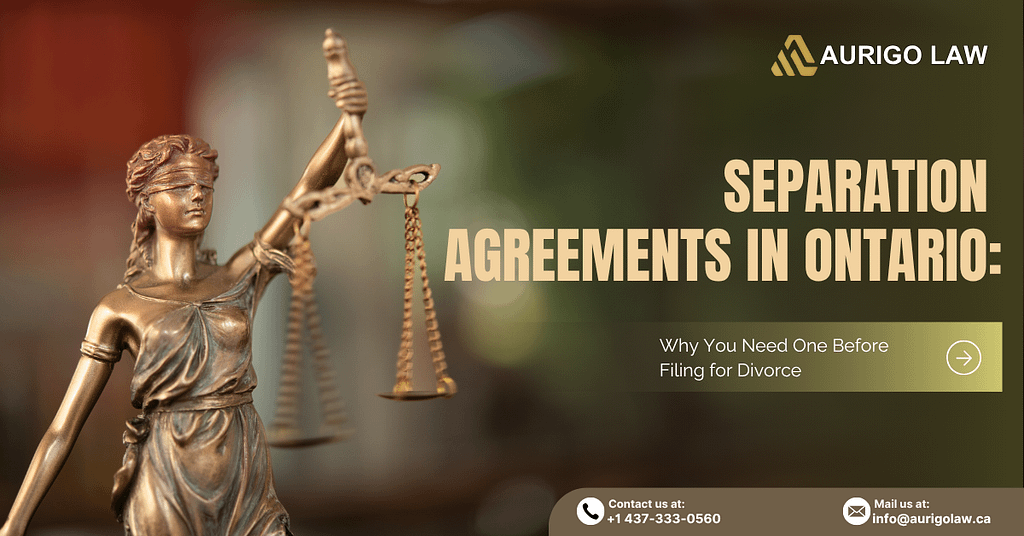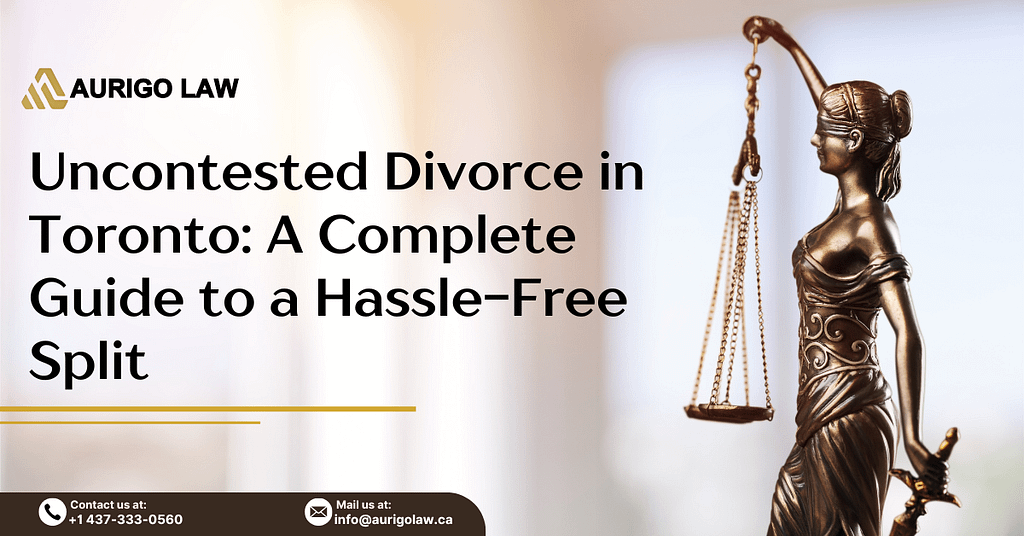Divorce Mediation vs. Court Litigation: Which One is Right for You?
Divorce Mediation vs. Court Litigation: Which One is Right for You? Divorce is never just a legal process – it’s deeply personal, emotional, and often life-changing. And one of the most important decisions you’ll make early on is how you want to resolve it: through divorce mediation or court litigation. At Aurigo Law, we help clients across Toronto navigate the separation process with the clarity they need to make empowered decisions. Whether your priority is protecting children, reducing legal fees, or preserving your privacy, understanding the differences between mediation and litigation is critical. Here’s a deep dive into what each process involves, when to choose one over the other, and how to get the support you need. What is Divorce Mediation & How Does It Work? Divorce mediation is a voluntary, non-adversarial process where both spouses work with a neutral third party—called a mediator—to reach agreements on issues like: Property and asset division Spousal support Parenting time and decision-making Child support The goal? To resolve disputes out of court in a cooperative, cost-effective way. How It Works: Both parties agree to participate A trained mediator (often with a legal or mental health background) facilitates discussion Solutions are documented in a separation agreement Each party is encouraged to seek independent legal advice (ILA) before signing While mediators help guide discussions, they do not provide legal advice. You should always consult a family lawyer before finalizing any agreement. Key Differences Between Mediation & Litigation Understanding the core distinctions between mediation and litigation helps you choose the approach that best fits your situation. Aspect Mediation Litigation Process Informal, collaborative discussions Formal, adversarial court proceedings Decision Maker The spouses (with mediator’s guidance) A judge makes the final decision Timeline Typically 2–6 sessions over a few weeks/months Can take several months to years Cost Generally lower Higher due to court fees and legal representation Privacy Private and confidential Public court records and hearings Flexibility Customized solutions Court-bound rulings based on precedent Enforceability Becomes binding once turned into a legal contract Binding through court orders Pros & Cons of Choosing Mediation for Divorce Benefits of Mediation Lower Legal Costs: Mediation typically costs a fraction of litigation Faster Resolutions: No need to wait for court dates Control: You and your spouse make the decisions, not a judge Preserves Relationships: Especially helpful for co-parents Confidentiality: Keeps personal matters out of the public record According to the Ministry of the Lawyer General (Ontario), cases that resolve through mediation are 3x more likely to conclude within six months compared to those that go to court. Potential Drawbacks Not legally binding unless turned into a written separation agreement May not work in high-conflict situations Can be imbalanced if one party is more assertive or informed Mediators can’t give legal advice—you’ll still need a lawyer When Should You Consider Court Litigation Instead? While mediation is ideal for many couples, it’s not always appropriate—especially when power imbalances, financial control, or safety concerns exist. Choose Litigation if: One spouse refuses to disclose financial information There’s a history of abuse, coercion, or intimidation You’re at a legal impasse on a major issue like custody or asset division Urgent interim court orders are needed (e.g., restraining order, exclusive possession) A spouse is being uncooperative or intentionally delaying the process At Aurigo Law, we assess your case thoroughly before advising mediation or litigation. In some cases, we begin with negotiation and escalate only if necessary. Cost Comparison: Mediation vs. Court Divorce in Toronto Legal costs can significantly impact the divorce process—emotionally and financially. Here’s a general cost comparison in the Toronto area: Divorce Type Estimated Cost (Per Spouse) Uncontested Divorce (No Lawyer) $700–$1,000 CAD Mediation (Full Scope) $1,500–$5,000 CAD Court-Litigated Divorce $10,000–$50,000+ CAD Costs increase with the complexity of the case, number of contested issues, and length of time before settlement. “We always try to resolve matters through negotiation or mediation first. Court should be the last resort—never the first step,” notes Arshi Chandel. Real-World Case Study: Mediation vs. Litigation Case 1: Mediation Success Shalini and Amir, both professionals living in Mississauga, chose mediation after six years of marriage. With no major disputes and shared goals for co-parenting, their separation agreement was finalized in four sessions. They saved thousands in legal fees and finalized the divorce within three months. Case 2: Litigation Required In contrast, David and Priya had complex property issues and conflicting views on parenting. After failed mediation, litigation became necessary. Their case took 16 months and included a trial, costing over $40,000 in combined legal fees. FAQs How much does divorce mediation cost in Ontario? It depends on the complexity and number of sessions. On average, mediation ranges from $1,500 to $5,000 CAD per party, much lower than litigation. Can mediation work if we don’t agree on everything? Yes. Mediation helps identify areas of agreement and manage areas of dispute. Even partial agreements can reduce what needs to be decided in court. Is mediation legally binding? Only once the terms are put into a separation agreement and signed with independent legal advice (ILA). A mediator cannot enforce decisions themselves. What happens if mediation fails? If mediation doesn’t resolve all issues, you can proceed with litigation or arbitration. Any partial agreements can still be useful during settlement talks. Do I need a lawyer for divorce mediation? While not mandatory during sessions, you should have a family lawyer review the agreement before signing it. This ensures your rights are protected. Which Path is Right for You? The choice between mediation and litigation depends on your relationship dynamic, complexity of your issues, and willingness to compromise. Mediation offers a collaborative, cost-effective approach—but it’s not always realistic in every situation. At Aurigo Law, our approach is tailored to your unique case. Whether you need a skilled divorce mediator, an experienced family lawyer, or full representation in a contested matter, Arshi Chandel and the team are here to guide you with clarity, compassion, and confidence. Let’s Talk About Your Options Aurigo Law 190 Parkhome Avenue, Toronto, Ontario M2R
Divorce Mediation vs. Court Litigation: Which One is Right for You? Read More »










